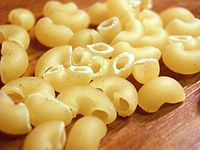
Photo from wikipedia
The high-moisture extrusion of proteins from plant and animal sources should be a new way for developing alternative protein products with meat-like texture. The protein gelling properties are considered an… Click to show full abstract
The high-moisture extrusion of proteins from plant and animal sources should be a new way for developing alternative protein products with meat-like texture. The protein gelling properties are considered an important factor for the meat-like texture formation during the high-moisture extrusion processing. In this study, the mixed protein gelling properties from soy protein isolate (SPI) and surimi at different ratios (90:10, 80:20, 70:30, 60:40 and 50:50) were investigated to relate to the high-moisture (70%) extruding product textural properties, correspondingly. Results showed that at SPI–surimi ratio 60:40, the heat-induced gelation time was clearly extended and the gel strength became much weaker. During the high-moisture extrusion processing, at SPI–surimi ratio 80:20, the extrudate showed the higher hardness, chewiness, gel strength and fibrous degree, while excessive surimi (more than 40%) in the blends would hinder the fibrous-oriented structure formation. It suggested that SPI may act as the continuous phase that is dispersed by surimi during the high-moisture extrusion processing. Interestingly, it was found that the gel strength of SPI–surimi blends was nonlinearly correlated with the specific mechanical energy (SME) and product textural properties. The study would be helpful for improving the textural properties of alternative protein products from soy and surimi.
Journal Title: Foods
Year Published: 2022
Link to full text (if available)
Share on Social Media: Sign Up to like & get
recommendations!